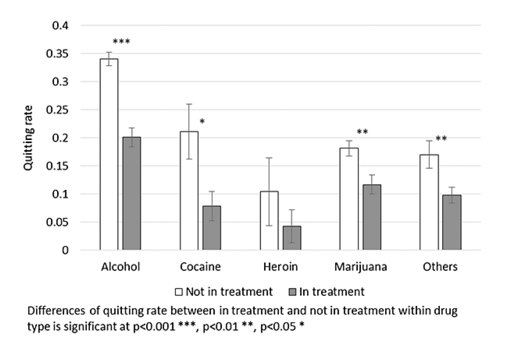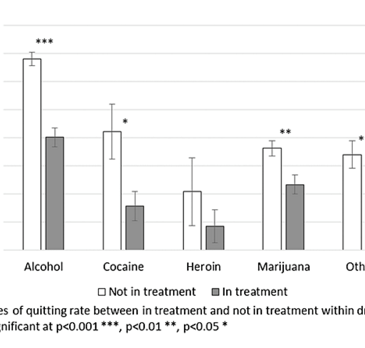People with substance use disorders (SUD) are 2-4 times more likely to use tobacco — and suffer the consequences — than the general population[1]. Though research shows that people can quit smoking while managing their SUDs, many SUD treatment providers deprioritize quitting smoking, perhaps sending the message that quitting smoking during SUD treatment is too difficult or will negatively affect their patients’ treatment outcome[2]. Researchers Chang Shu and Benjamin Lê Cook recently examined the difference in rates of quitting smoking for individuals with and without lifetime SUD treatment. This week, ASHES reviews their study[3].
What was the research question?
Are individuals with a past year substance use disorder who have ever accessed SUD treatment more or less likely to quit smoking than those who have never received SUD treatment?
What did the researchers do?
Shu and Cook used the 2009-2012 National Survey on Drug Use and Health to identify 12,796 adult smokers with a past year SUD. They defined SUD treatment to include treatment in a hospital or physician’s office, a rehabilitation center, a community mental health center, or treatment received during incarceration. They defined quitting smoking as not using tobacco in the last 30 days.
What did they find?
Adult smokers with a past year SUD were less likely to quit smoking if they had a history of SUD treatment than if they had no SUD treatment. This was consistent across different substances but was not statistically significant for individuals who primarily use heroin, as you can see in Figure.

Figure. The rate of quitting smoking for individuals with SUD for various substances who have and have not been in treatment. Adapted with permission from Addiction. Click image to enlarge.
Why do these findings matter?
Individuals with SUD are more likely to die of tobacco-related causes than due to their drug of choice, so it is important to introduce them to resources for quitting whenever possible, including while in SUD treatment[4] . More research will be necessary to fully understand how quitting smoking impacts overall SUD treatment outcomes.
Every study has limitations. What were the limitations in this study?
Although the researchers adjusted for SUD diagnosis, type of substance use, and socioeconomic data, there may be other variables that influence why an individual is less likely to quit smoking if they have a history of SUD treatment.
For more information:
If you or a loved one wants to quit smoking, here is a list of resources from the CDC. For those who believe they may have a substance use disorder, here is some information on different types of SUD treatment. For additional tools, please visit the BASIS Addiction Resources page.
— Layne Keating
What do you think? Please use the comment link below to provide feedback on this article.
________________
[1] Kalman, D., Morissette, S. B., & George, T. P. (2005). Co-Morbidity of Smoking in Patients with Psychiatric and Substance Use Disorders. The American Journal on Addictions / American Academy of Psychiatrists in Alcoholism and Addictions, 14(2), 106–123. http://doi.org/10.1080/10550490590924728
[2] Lemon, S. C., Friedmann, P. D., & Stein, M. D. (2003). The impact of smoking cessation on drug abuse treatment outcome. Addictive Behaviors, 28(7), 1323–1331.
[3] Shu, C., & Cook, B. L. (2015). Examining the association between substance use disorder treatment and smoking cessation. Addiction (Abingdon, England), 110(6), 1015–1024. http://doi.org/10.1111/add.12879
[4] Hurt, R. D., Offord, K. P., Croghan, I. T., Gomez-Dahl, L., Kottke, T. E., Morse, R. M., & Melton, L. J. (1996). Mortality following inpatient addictions treatment. Role of tobacco use in a community-based cohort. JAMA, 275(14), 1097–1103.




